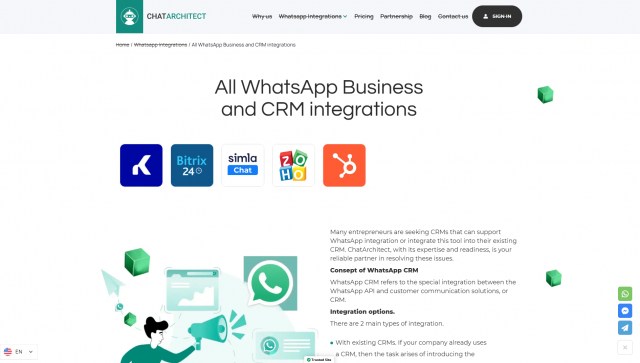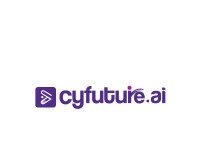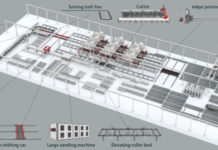(Isstories Editorial):- Banska Bystrica, Banskobystricky Jul 8, 2025 (Issuewire.com) – chatarchitect.com, CRM WhatsApp integration is revolutionizing customer engagement in 2025 by enabling businesses to connect with customers on the world’s most popular messaging platform. With WhatsApp’s massive user base and the growing demand for instant, personalized communication, companies are leveraging this integration to streamline operations, increase sales, and improve customer loyalty. This article explores how CRM WhatsApp tools are reshaping business strategies, offering practical benefits, real-world applications, and a glimpse into the future of AI-driven messaging.
Introduction: Changing Expectations in Digital Communications
The way customers communicate with companies has undergone a seismic shift. By 2024, WhatsApp will have over 2.5 billion monthly active users worldwide, making it the leading messaging platform (Statista, 2024). Its dominance spans regions from Asia and Latin America to Europe and Africa, where it serves as the primary communication tool for both personal and professional interactions. Meanwhile, traditional channels such as email and phone calls are losing effectiveness. Email open rates average 20-30%, and marketing campaign response rates are even lower (HubSpot, 2024). Cold calling fares even worse, with conversion rates below 2% and a growing consumer aversion to unsolicited calls (Salesforce, 2024).
More on Isstories:
- Curantis Solutions and WorldView Partner to Bring Faster, Clearer Workflows to Hospice and Palliative Care Teams
- Debut Fantasy Novel The Other Kind: The Rise by Yusuf Bhatti Explored.
- Bluecoin IoT Brings AI-Ready Facility Intelligence to FWM India Summit 2026
- Haris Vitalaki Presents Know No Studies: A Poetic Exploration of Freedom, Thought, and Inner Truth
- Bimetal vs Carbon Steel: Insights From China Leading Bimetal Self Drilling Screws Manufacturer Fasto
Customers now demand instant, conversational, and convenient interactions. They prefer messaging apps to clunky forms or long wait times on the phone. This shift reflects a broader trend: 78% of consumers say they’re more likely to engage with brands that offer real-time communication on their preferred platforms (Gartner, 2025). For businesses, meeting these expectations means integrating messaging apps like WhatsApp with their customer relationship management (CRM) systems to enable seamless, scalable, and data-driven engagement.
What is CRM WhatsApp Integration?
CRM WhatsApp Integration connects the business-friendly features of WhatsApp to CRM platforms, enabling companies to manage customer interactions within a unified customer experience across channels and automate workflows. At its core, it leverages the WhatsApp Business API, a robust solution designed for medium to large enterprises. The API enables businesses to send transactional messages, manage multiple chats, and integrate with existing systems such as Salesforce, Zoho, or Bitrix24.
Key components of the CRM WhatsApp integration include
- Chatbots: AI-powered bots handle routine inquiries, walk users through processes, and provide instant responses, reducing human workload.
- Multi-Agent Dashboards: Support teams can access a centralized panel to collaborate on customer chats, assign tasks, and track progress in real time.
- Data Synchronization: Customer interactions are synchronized with CRM databases, enabling personalized outreach based on purchase history, preferences, and demographics.
Modern businesses increasingly rely on CRM WhatsApp systems to centralize chats, automate responses, and personalize outreach. This integration eliminates the chaos of scattered communications and empowers teams to deliver consistent, high-quality experiences.
Key benefits for 2025 businesses
CRM WhatsApp integration delivers measurable benefits that position businesses for success in a hyper-competitive landscape. Here are the key benefits:
- Automation of routine tasks:
- Chatbots handle up to 70% of customer inquiries, including FAQs, product details, and scheduling (Forrester, 2025). This reduces manual effort and cuts response times by 80%, allowing teams to focus on complex, high-value tasks like closing deals or resolving escalations.
- Automation also minimizes errors in repetitive tasks such as order confirmations or payment reminders, ensuring accuracy and professionalism.
- Provide 24/7 customer support without increasing headcount:
- AI-powered chatbots provide round-the-clock support, answering queries immediately, even across time zones or after business hours. This capability is critical for global enterprises serving diverse markets.
- Companies report a 30% reduction in support costs by automating first-line responses without compromising customer satisfaction (Zendesk, 2024).
- Increase customer loyalty with immediate responses:
- Speed matters: 82% of customers expect a response to support queries within 10 minutes (Gartner, 2025). WhatsApp’s real-time messaging meets this demand, increasing satisfaction rates by 30% and improving customer retention.
- Personalized responses based on CRM data make customers feel valued, driving long-term loyalty and repeat business.
- Higher conversion rates:
- The conversational nature of WhatsApp drives engagement. Businesses using WhatsApp for sales report 25-40% higher conversion rates compared to email or web forms (McKinsey, 2024).
- Features like quick replies, product catalogs, and payment links simplify the buyer’s journey, reducing friction and accelerating purchases.
- Improved operational visibility:
- Centralized dashboards provide visibility into every customer interaction, enabling managers to track team performance, monitor response times, and identify bottlenecks.
- Analytics tools within CRM systems provide insight into customer behavior, helping companies refine their strategies.
Use cases across industries
CRM WhatsApp integration is versatile and delivers value across industries. Below are real-world applications that demonstrate its impact:
- Retail:
- Retailers are using WhatsApp to process orders, send delivery updates, and manage returns. For example, a fashion brand can use chat to share order confirmations, track shipments, and offer style recommendations, reducing shopping cart abandonment by 25% (McKinsey, 2024).
- Personalized promotions triggered by CRM data drive upsells and cross-sells, increasing average order value by 15% (Econsultancy, 2025).
- Finance:
- Banks and fintechs use WhatsApp for secure customer verification, payment reminders, and account updates. Two-factor authentication over WhatsApp increases security while maintaining convenience.
- Automated notifications about loan approvals or credit card transactions build trust and reduce call center volume by 20% (Deloitte, 2024).
- Education:
- Online learning platforms automate course registration, send class reminders, and answer student questions via WhatsApp. This increases engagement by 40% and reduces administrative workload (EdTech Review, 2025).
- Universities are using WhatsApp to communicate with prospective students, sharing program details and application deadlines to increase enrollment.
- Telecom/IT:
- Telecom providers provide technical support, troubleshoot connectivity issues, and share software updates via WhatsApp. This reduces ticket resolution time by 50% and improves customer satisfaction (Zendesk, 2024).
- IT companies use WhatsApp to notify customers about system maintenance or cybersecurity alerts, ensuring timely communication.
- Healthcare:
- Clinics and telehealth platforms schedule appointments, send prescription reminders, and share health tips via WhatsApp. This improves patient adherence by 35% and reduces no-show rates (HealthTech Magazine, 2025).
- Hospitals use WhatsApp for post-treatment follow-up, improving continuity of care without adding staff.
The Future Outlook: AI + Messaging + CRM
The future of CRM WhatsApp integration lies at the intersection of artificial intelligence (AI), messaging, and CRM systems. Large Language Models (LLMs) like ChatGPT are transforming chatbots into sophisticated conversational agents capable of understanding context, handling complex queries, and mimicking human-like interactions. By 2026, 70% of enterprises are expected to deploy AI-powered CRM messaging solutions, up from 35% in 2024 (IDC, 2025).
Key trends shaping the future include
- Advanced AI chatbots: LLMs enable bots to manage nuanced conversations, such as negotiating discounts or resolving complaints, reducing escalations to human agents by 40% (Forrester, 2025).
- Seamless CRM integrations: Platforms like Zoho, HubSpot, Bitrix24, and Monday.com are expanding WhatsApp compatibility, allowing companies to unify customer data across sales, marketing, and support. This creates a 360-degree view of the customer and drives personalized engagement.
- Omnichannel expansion: WhatsApp is increasingly integrated with other channels such as SMS, email, and social media within CRM systems, ensuring consistent messaging across touchpoints.
- Voice and video integration: WhatsApp’s evolving features, such as voice calling and video chat, are being integrated into CRM workflows, enabling richer customer interactions.
- Predictive analytics: AI-powered CRM analyzes WhatsApp conversations to predict customer needs, recommend next best actions, and optimize marketing campaigns.
These advancements position CRM WhatsApp integration as a cornerstone of digital transformation, enabling businesses to stay agile and customer-centric.
The bottom line: Why Brands Shouldn’t Wait
In 2025, CRM WhatsApp integration is no longer a luxury – it’s a necessity. Early adopters will gain a competitive advantage by meeting customer demand for instant, personalized, and convenient communication. With WhatsApp’s unmatched reach, AI-driven automation, and seamless CRM connectivity, businesses can improve efficiency, increase conversions, and build lasting customer loyalty.
The data is clear: companies using WhatsApp CRM tools see 30% higher customer satisfaction, 25% higher conversion rates, and significant cost savings (Gartner, McKinsey, 2024). As AI and messaging technologies continue to evolve, the gap between adopters and laggards will continue to widen. Now is the time to act.
Explore CRM WhatsApp solutions today to transform your customer engagement strategy. Whether you’re in retail, finance, education, or beyond, integrating WhatsApp with your CRM system will position your brand for success in the digital-first world of 2025.
This article was originally published by IssueWire. Read the original article here.





















